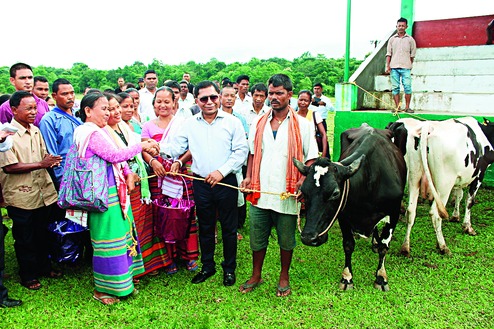
Ampati, July 24: Meghalaya chief minister Mukul Sangma today said 10,000 families in the state would benefit from the ambitious livestock mission, wherein Holstein Friesian (HF), a high yielding dairy cattle, would be given away to beneficiaries on a "cluster approach".
Holstein Friesians originated from the Dutch provinces of North Holland and Friesland and what is now Schleswig-Holstein in Northern Germany and Jutland. They are known as the world's highest-production dairy animals.
The cows produce milk up to 32,740 litres yearly. They eat about 45kg of feed, a combination of hay, grain, silage and proteins such as soybean meal, plus vitamins and minerals.
"About 5,000 families in three blocks of Garo hills and 5,000 in three blocks of Khasi-Jaintia hills will benefit from the scheme in the next three years," said Mukul, while handing over the HF breed of cattle at Ampati in South West Garo Hills.
Six head of cattle were distributed to six self-help groups (SHGs) of South West Garo Hills as a token during the launch.
Mukul said each SHG would receive 10 head of cattle once they are able to demonstrate their ability to provide the required care and attention to the animals.#The SHGs were all excited to receive the benefit of the scheme, which aims to create livelihood opportunities for farmers.
"The state is facing a major challenge of uncontrolled migration from rural to urban areas. We want to reverse the trend and ensure that livelihood opportunities are available in the backyard. Dairy farming has evolved with technological intervention, and we want to make it attractive and ensure a sustainable model for economic prosperity."
Mukul said a lot of comprehensive interventions have been taken up by the government to provide livelihood opportunities and dairy farming was part and parcel of the livestock mission. The chief minister said the breed has withstood the test of time and has been found suitable to be reared by farmers in the state.
"Dairy farming would open up new avenues for other ancillary activities and we would encourage educated youths to take advantage of the programme and leverage income generation for their sustained livelihood," the chief minister said.
The breed has the capacity to generate up to 40 litres of milk per day, if properly fed. The chief minister said the farmers would get a minimum of Rs 16,000 per month by rearing each cow during the milking period.
"The government would extend support for collection of milk, distribution and further value addition for different milk products," Mukul said. He said there would be continuous training to handhold the farmers as well as build capacity for value addition of milk products. "We would train our youths and farmers to produce handmade chocolate, cheese and other dairy products in Garo hills," he said.
The chief minister is confident that dairy farming would bring about newer opportunities based on demand and supply.
Around 10,000 cattle each in Garo hills and Khasi-Jaintia hills will be brought as part of the programme.











